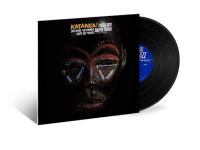Katanga! Proves West Coast Jazz Need Not Be "Cool"
If you’re unfamiliar here’s what you should know: this 1963 release was saxophonist Curtis Amy’s 6th and final Pacific Jazz album and trumpeter Dupree Bolton’s first and last for Pacific Jazz or for anyone else—though some live television appearances with Amy were cobbled together to produce the appropriately titled Fireball. Bolton was thirty-three when this session was recorded and while he died in 1993 at age sixty four, sadly he spent much of that time either strung out or in jail on various charges. That can happen when you leave home for a jazz life on the road at age 15.
In addition to his Pacific Jazz output Curtis Amy helmed a few other recorded sessions and for a time led The Ray Charles Orchestra. He also recorded with Dizzy Gillespie, Lou Rawls and Gerald Wilson and worked as a music educator and in the record business. He wasn’t averse to playing studio rock sessions. He’s heard on Carole King’s Tapestry and he played the solo on The Doors song “Touch Me”. He was married to Merry Clayton, who of course sang the searing “rape, murder, it’s just a shot away” “Gimme Shelter” chorus.
This session opens with Dupree Bolton’s amped up title tune, which at first might have you thinking your turntable is spinning a familiar Blue Note kind of session accidentally at 45rpm. Bolton’s on fire out of the gate and at first Amy just lets him rip before getting into the groove, backed by Victor Gaskin on bass, Jack Wilson on piano, Doug Sides on drums and the unmistakable Ray Crawford on guitar. Fans of Gil Evans’ Out of the Cool will recognize Crawford on “Native Land”, which sounds an awful lot like Evans’ La Nevada” recorded a few years earlier.
Following the opening “barn burner”, the group settles into the bump and grind groove of “Lonely Woman,” followed by the aforementioned “Native Land” that in turn sounds something like the extended break on The Doors “Light My Fire”. It’s Crawford’s chance to take charge and he makes the most of it.
Side two opens with “Amyable”— a Jack Wilson original that also gives Crawford wide open opportunities before Bolton takes charge with a series of searing solos over drummer Sides’ insistent woody rim shots the recording so well captures. A cover of the familiar ballad “You Don’t Know What Love Is” bathes Amy’s soprano sax in sultry reverb after which Bolton lays out a magnificent and muscular extended run off of the melody that makes Chet Baker’s take on the tune sound kind of soft.
The breezy closer “A Shade of Brown” gives everyone space in which to stretch out—especially Crawford. Fortunately Bolton adds plenty of dazzle before the final fade,both solo and in lock step with Amy after which he sadly exited the building, leaving unfulfilled his contract with Pacific Jazz Records.
The sound on the opening tune is somewhat bright and a bit “pinched”, which might cause you to lower the volume and think perhaps you’re in for a shrill two sides, but things turn sonically rich and full on “Lonely Woman” and remain there throughout the album.
World Pacific owner and recording engineer Richard Bock does an outstanding job recording all of the instruments, placing them in a believable three-dimensional space. Crawford’s guitar in particular is reproduced with a rich juicy/crisp tone and texture you’re sure to enjoy.
Add new useful annotation by Stereophile contributing editor and noted jazz journalist Thomas Conrad and you have a not to be missed Tone Poet release previously only available as a costly import of dubious origin. You won’t regret the purchase. I didn’t.



